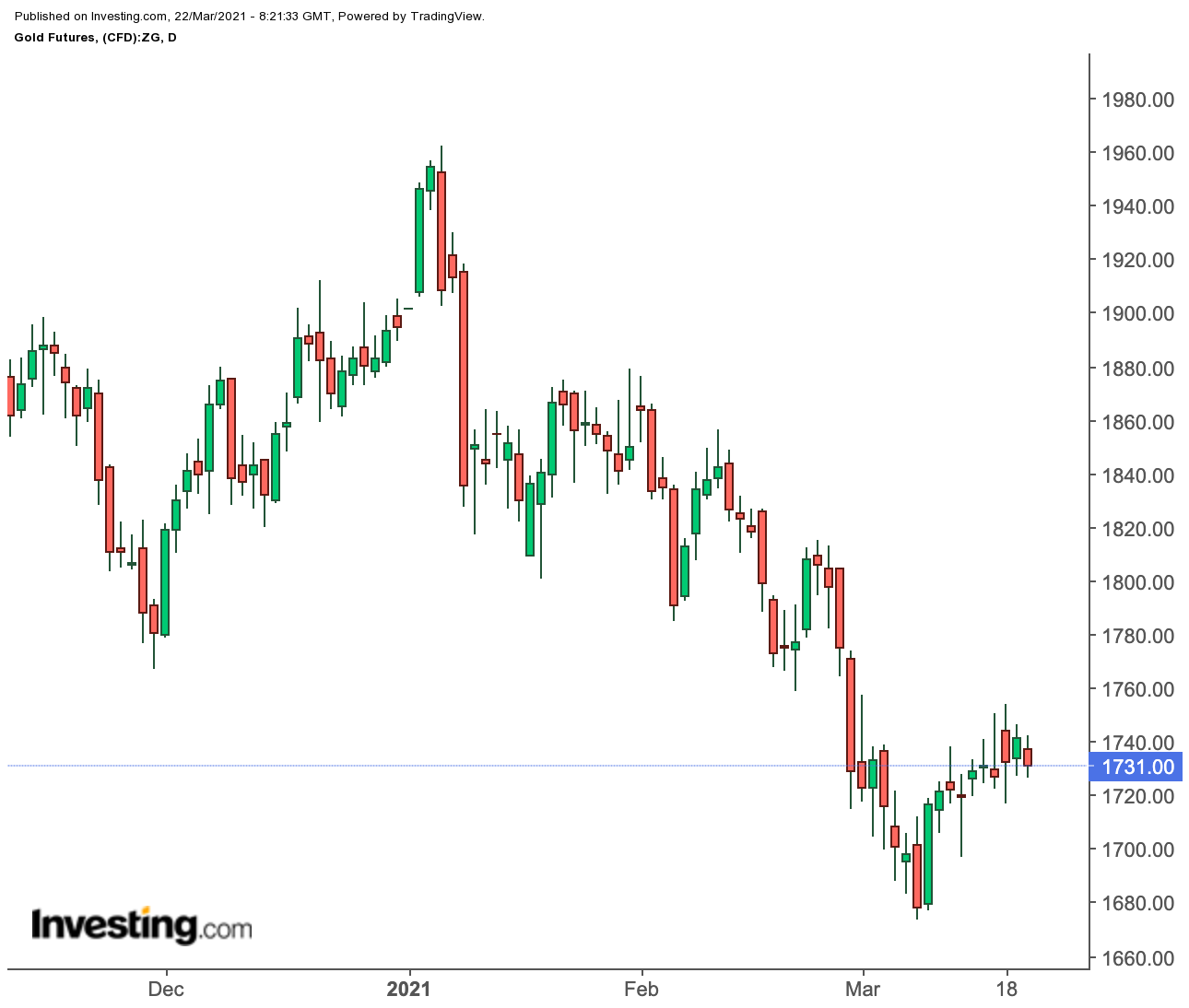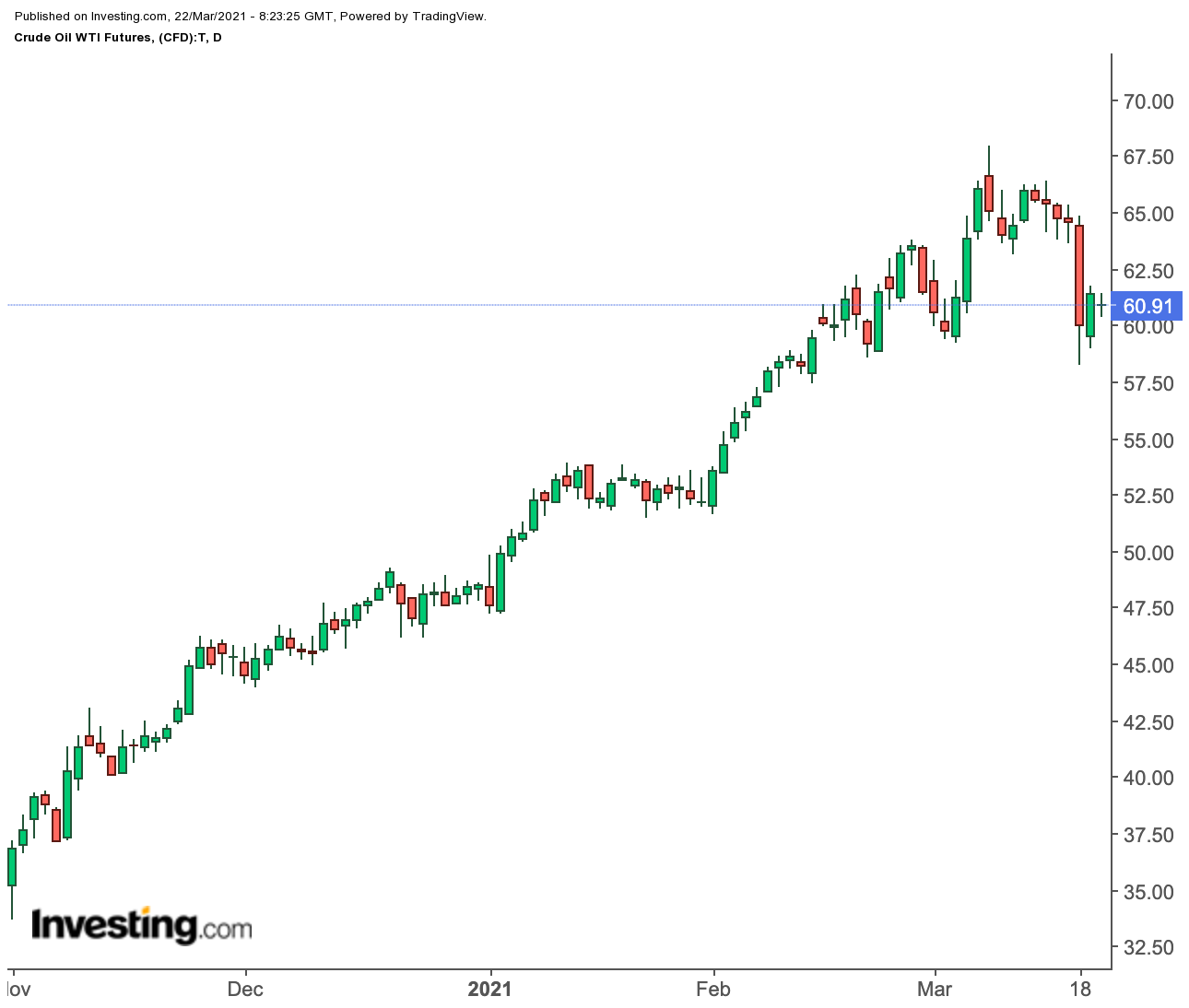Gold is expected to get above the $1,750 target it missed last week in its aim to return to the $1,800 berth, as Federal Reserve Chairman Jerome Powell and Treasury Secretary Janet Yellen testify before Congress amid the surge in US bond yields.

US crude oil, is, meanwhile, expected to avoid a return below the $60 mark hit last week, as the prospect of more COVID-19 lockdowns in Europe keep concerns about fuel demand on the boil.

Powell and Yellen will appear before the House Financial Services Committee on Tuesday and the Senate Banking Committee on Wednesday to discuss the health of the US economy and the importance of fiscal and monetary stimulus in the recovery from the pandemic.
There are also more than half a dozen other Fed officials due to speak during the week, including Vice Chairman Richard Clarida, Vice Chairman Randal Quarles, Fed Governor Lael Brainard, and New York Fed President John Williams.
Will Powell Or Yellen Offer Insight Into Tapering?
Aside from their testimony on the economy, investors will also be hoping to glean an insight into how much higher Powell and Yellen would be willing to let Treasury yields go before resorting to what is popularly known as tapering.
US bonds’ benchmark 10-year Treasury note hit a session high of 1.707% by 12:00 AM ET (4:00 GMT), after Thursday’s 13-month high at 1.754%.
Financial markets have diverged from the Fed’s outlook for monetary policy, pricing in a first rate hike sooner than the central bank expects. This comes amid fears of a runaway recovery in a pandemic-hit economy as the Biden administration’s $1.9 trillion stimulus goes to work.
“Maybe we can see it fall way back to 1.50 (%),” Jim Bianco of Bianco Research said on CNBC, referring to the 10-year Treasury note. “But I wouldn’t consider that anything more than a respite in a move for longer-term for higher-yields.”
Bond yields have surged on the argument that economic recovery in the coming months could extend beyond the Fed expectations, leading to spiralling inflation, as the central bank insists on keeping interest rates at near zero.
The dollar, which typically falls in an environment of heightened inflation fears, also rallied on the same runaway economic recovery logic. The greenback’s status as a reserve currency has bolstered its standing as a safe haven, leading to new long positions being built in the dollar. On Monday, the Dollar Index, pitted against six major currencies, was at 91.98, nearing the key 92 level.
The surging dollar and bond yields have been an anathema to gold, forcing the yellow metal to lose 17% from record highs of nearly $2,100 in August. At 4:00 GMT on Monday, gold futures on New York’s COMEX were almost flat at $1,741.65, recovering from a session low of $1,731.55.
For decades, gold was touted as the best store of value whenever there were worries about inflation. Yet, in recent months, it was deliberately prevented from being the go-to asset for investors as Wall Street banks, hedge funds and other actors shorted the metal while pushing up US bond yields and the dollar instead.
Any indications by the Fed that it will intensify bond buying in the coming months could be just the thing to clamp down on yields and spark a rally in gold.
But Powell in his monthly news conference on Wednesday declined to give any hint of the central bank adding to its Treasury purchases.
Gold Will Gain More Attention If S&P Weakens
Powell said that as the year progresses, the US jobless rate will likely decline from February’s 6.2% while inflation expands 2.4% amid an overall 6.5% growth in GDP expected in an economy rebounding from a pandemic-stricken 2020.
Thus, it will be a wait-and-see for further tinkering of Fed policy, he said.
“The next few months will be very tricky in identifying what will be the primary catalysts for bullion investors,” said Ed Moya, analyst at New York’s OANDA. “Wall Street will remain fixated on the bond market selloff and recent disdain for technology stocks.”
Moya said gold was beginning to gain some investor attention because rising Treasury yields will eventually be countered by action from the Federal Reserve.
“The S&P 500 index won’t be able to climb higher if mega-cap tech stocks don’t get their groove back and any hesitancy in that trade should trigger some safe-haven flows into gold.”
Gold is in a better position now, rising 0.7% month-to-date, after the 9% drop in January through February. But its return to $1,800 and beyond will also be a wait-and-see of the Fed and S&P.
Oil Tries To Find Floor After Weekly Plunge
In oil’s case, New York-traded West Texas Intermediate, the benchmark for US crude, was at $61.22 per barrel by 4:00 GMT, down 22 cents, or 0.4%.
London-traded Brent, the global benchmark for oil, was at $64.25, down 28 cents or 0.4%.
Crude prices fell 7% last week, the first meaningful drop after a near five-month rally with barely any stops. The run-up was driven by OPEC+ production cuts, the promise of economic reopenings from coronavirus closures and the blockbuster US pandemic relief.
Virtually overlooked in that time was the anemic demand for jet and other transportation fuels as global travel remained heavily curtailed by the pandemic. Europe’s constant struggle with new outbreaks of COVID-19 infections; its alarmingly slow pace of vaccinations; and fresh lockdowns across the bloc were also treated with little seriousness.
On Thursday, however, those concerns came to a head, exacerbated by the 13-month highs in US Treasury yields and the Dollar Index’s spike to near 92. US WTI slumped to $58.20 while Brent fell to $61.45, both a five-week low.
Germany said on Thursday it planned to extend lockdowns to contain COVID-19 infections into a fifth month, after new cases exceeded levels authorities said will cause hospitals to be overstretched.
Said Stephen Innes, chief global market strategist at Axi, as quoted by Reuters:
"The reality is that we're still a long way from a full demand recovery, and it's the record levels of withdrawn production capacity that's the main prop for the oil market."
US drillers were also starting to take advantage of an earlier spike in prices on optimism about returning demand, adding the most rigs for extracting oil since January in the week through Friday.
The oil drilling rig tally, an early indicator of future production, rose by nine to 318 last week, the highest since April, energy services firm Baker Hughes said in its closely followed report on Friday.
The rig count has been rising over the past seven months and is up nearly 70% from a record low of 244 in August.
A Data Crammed Week For Oil And Gold
Both oil and gold prices could also react to a raft of US data due this week. This include durable goods orders and the personal income and spending reports, along with figures on new and existing home sales.
The housing data, together with the personal income and spending figures, which include the PCE deflator, the Fed’s preferred inflation measure, will probably show weakness, due to the impact of severe winter storms on economic activity in February. However, economists expect the slump to be short-lived.
The US is also to publish the latest revision of fourth quarter 2020 GDP, which was last reported at an annualized 4.1%.
Disclaimer: Barani Krishnan uses a range of views outside his own to bring diversity to his analysis of any market. For neutrality, he sometimes presents contrarian views and market variables. He does not hold a position in the commodities and securities he writes about.
